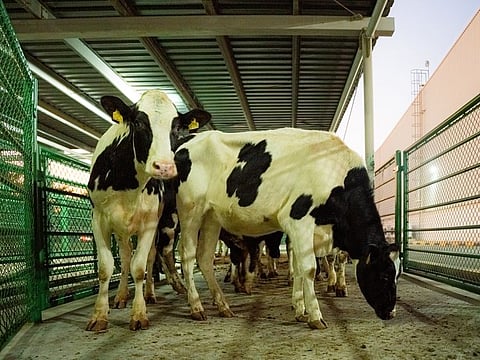UAE: 1,300 Danish cows land in Sharjah as demand rises for Meliha milk
Second batch carrying A2A2 genes arrives for Meliha Dairy Farm to produce organic milk

Sharjah: As many as 1,300 Danish cows have landed at Sharjah International Airport to boost the herd size of Meliha Dairy Farm, which is producing organic milk in high demand.
Their arrival, representing the second batch, comes in line with implementing the directives of His Highness Sheikh Dr Sultan bin Mohammed Al Qasimi, Member of the Supreme Council and Ruler of Sharjah, to raise the herd of the Maliha Dairy Farm to 8,000 by the end of 2025. This is in response to the increasing demand for fresh organic Meliha milk that retains all its natural components. These cows carry the A2A2 genes of the pure breed.
The cows are fed organic fodder free from chemical fertilisers and pesticides, and are non-GMO (genetically modified organisms), in addition to providing part of the organic feed from the wheat farm in Meliha, said Dr Khalifa Musabah Al Tunaiji, head of Sharjah Agriculture and Livestock Department and CEO of Ektifa.
The total number currently stands at 2,500 cows with the arrival of the second batch. The third batch, estimated at 1,500 cows, will arrive at the beginning of 2025, eventually bringing the farm’s herd to about 20,000 cows over the next three years.
Dr Al Tunaiji said: “Under the guidance and follow-up of His Highness Dr Sheikh Sultan bin Muhammad Al Qasimi, Member of the Supreme Council and Ruler of Sharjah, the increase in the number of cows at the Meliha Dairy Farm aligns with the continuous development of the Sharjah Food Security System to meet the needs of the local market and the growing demand for organic food products adopted by the system, especially Meliha milk.”
Lifestyle shift
He added that increasing the number of cattle in the farm to 20,000 heads over three years will “enable us to meet the needs of the local market and the Gulf markets as well, especially after the significant interest from communities in improving nutritional and health lifestyles”.
The department head pointed out that Ektifa is working to establish a culture of healthy and safe food quality through the development of research and scientific efforts that serve the community through clean organic products, and studying their benefits in collaboration with global universities, particularly Al Dhaid University.
This is part of wider efforts to promote the culture of sustainable food, support public health for community members, contribute to the prevention of weight gain and obesity, and reduce the risks of diet-related diseases, Dr Al Tunaiji said.



